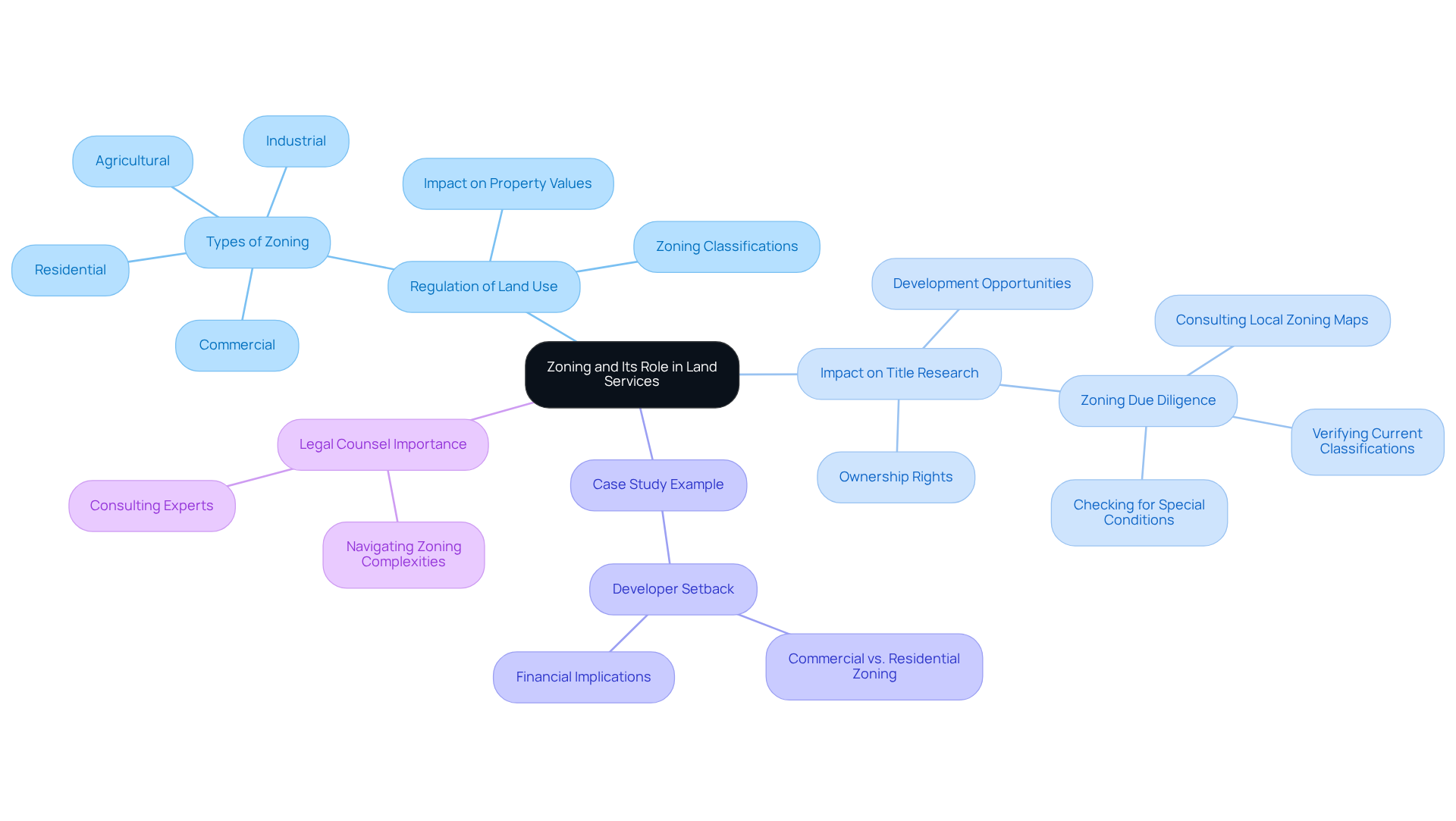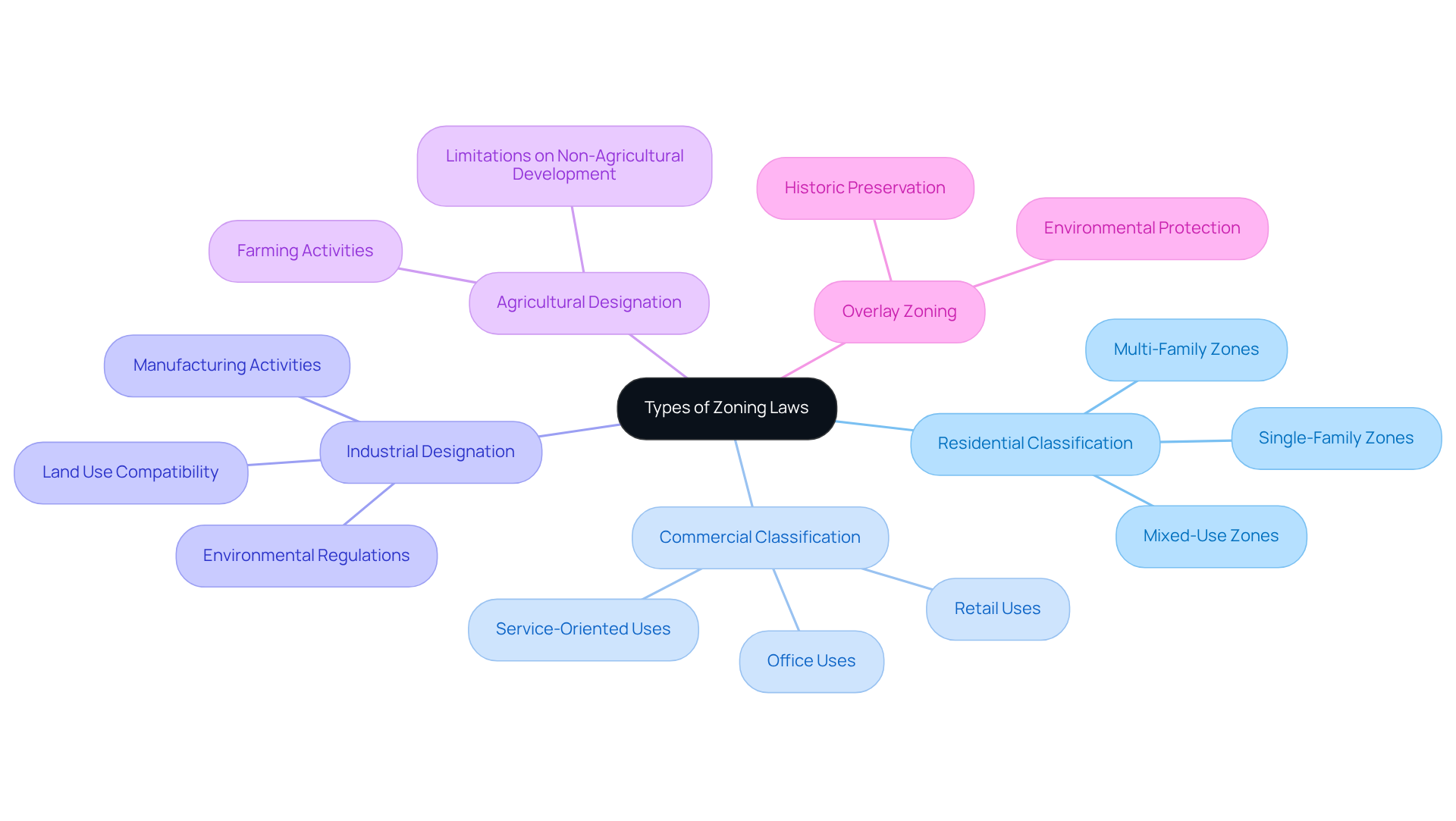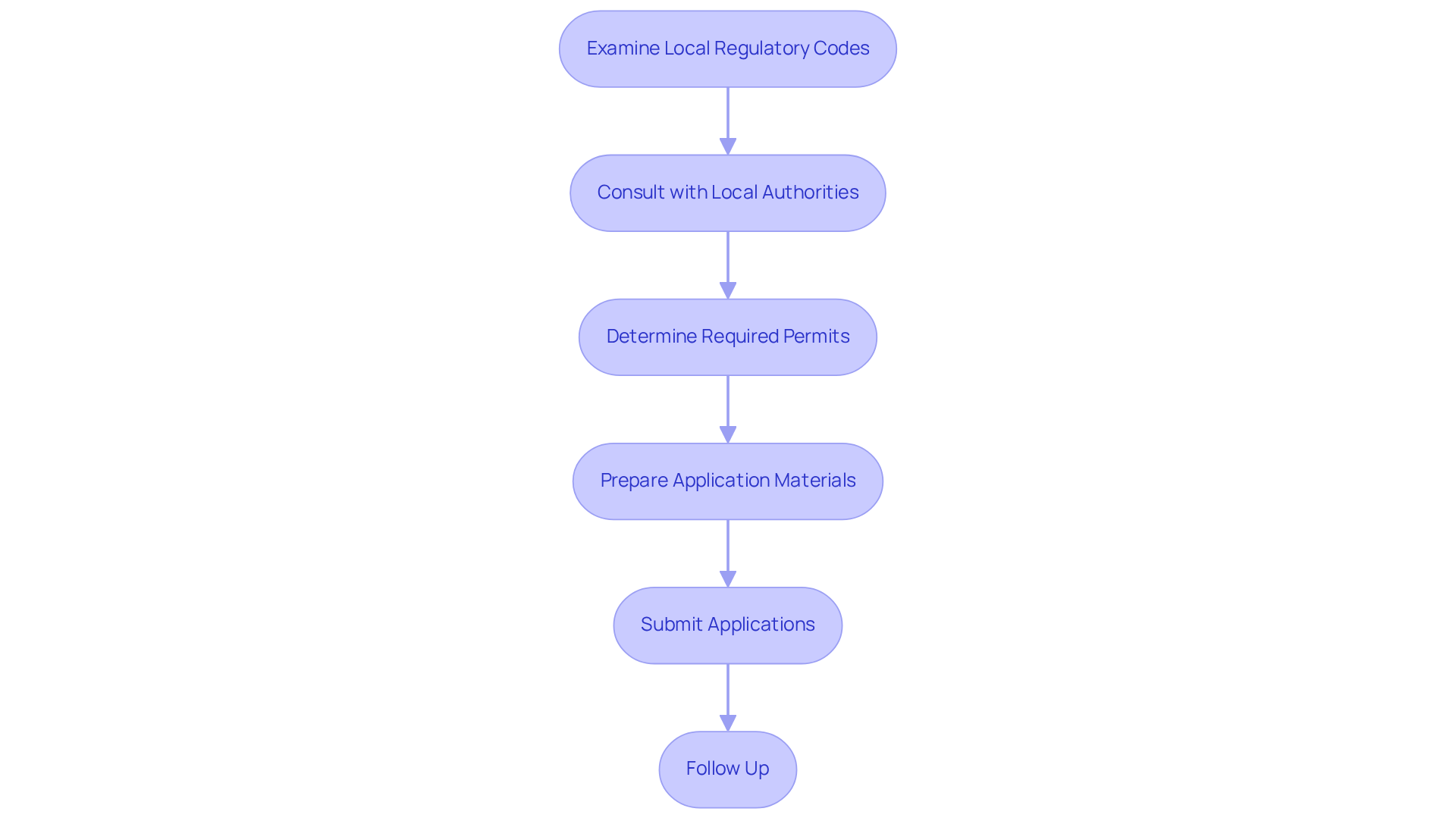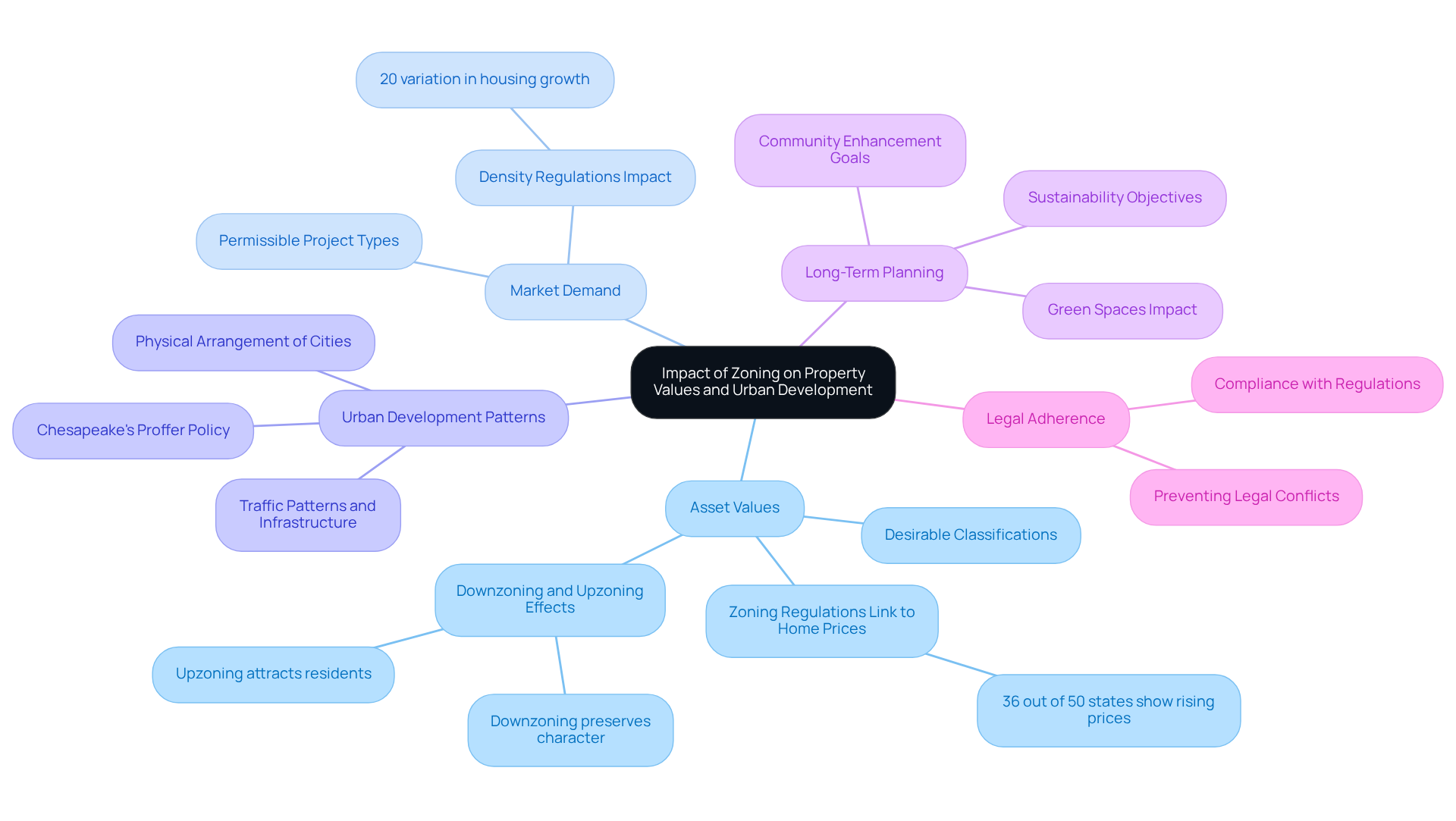Overview
Zoning plays a crucial role in shaping land services for title research by regulating land use, which directly influences ownership rights, property values, and development opportunities. This article delineates various zoning classifications and their implications, thereby underscoring the essentiality for title researchers to grasp these regulations. Such understanding is vital to circumvent costly setbacks and to ensure compliance during real estate transactions.
Introduction
Zoning plays a pivotal role in shaping the landscape of land services, dictating how land can be utilized and developed. For title researchers, understanding the nuances of zoning is not just beneficial—it is essential. This article delves into the intricate relationship between zoning regulations and title research, highlighting how these laws can significantly influence property ownership, development potential, and market values.
Furthermore, as the complexities of zoning evolve, how can title researchers navigate these regulations effectively to avoid costly pitfalls and maximize opportunities?
Define Zoning and Its Role in Land Services
Zoning serves as the legislative framework through which local authorities regulate land use and growth, demonstrating how by establishing specific guidelines for diverse activities, including residential, commercial, industrial, and agricultural purposes. These regulations are vital for maintaining order in urban planning and understanding how zoning impacts land services, while also safeguarding asset values and aligning land use with community objectives.
For title researchers, it is imperative to have a thorough understanding of how zoning impacts land services, as it directly influences ownership rights and future development opportunities. When conducting title research, professionals must evaluate how zoning impacts land services and current land use regulations to accurately determine property ownership and identify any constraints that may affect the land.
For example, a developer could encounter significant setbacks by acquiring land designated for commercial use, only to find it is zoned for residential purposes. This scenario was illustrated in a case study where a developer faced financial difficulties after such a revelation, highlighting how zoning impacts land services and the critical importance of land-use due diligence.
As urban planner Jess Barker aptly notes, 'Zoning laws are crucial in real estate, directing land use and growth.' Moreover, seeking legal and professional counsel is essential when navigating the complexities of how zoning impacts land services, as this ensures that title researchers remain informed about zoning classifications and potential alterations that could influence property values and development prospects.

Explore Types of Zoning Laws and Their Implications
Zoning laws can be categorized into several types, each demonstrating how zoning impacts land services with distinct implications for land use.
- Residential Classification: This type restricts land use to housing and related activities. It can further be divided into single-family, multi-family, and mixed-use zones, each with specific regulations regarding density and building types.
- Commercial Classification: This category permits business activities and encompasses retail, office, and service-oriented uses. Grasping commercial regulations is essential for title researchers, as it affects property value and possible business activities.
- Industrial Designation: This classification is allocated for manufacturing and industrial activities. Title researchers must be aware of the implications of industrial zoning, especially regarding environmental regulations and land use compatibility.
- Agricultural Designation: This type is intended for farming and related activities. It frequently incorporates limitations on non-agricultural development, which can influence land ownership and investment prospects.
- Overlay Zoning: This involves additional regulations that apply to specific areas, often to achieve particular goals such as historic preservation or environmental protection. Title researchers must consider these overlays when and potential uses.
Each land use category carries specific regulations that illustrate how zoning impacts land services, asset values, development potential, and compliance requirements. Thus, it is essential for title researchers to comprehend these distinctions.

Navigate Zoning Regulations and Permit Acquisition
Navigating land use regulations and acquiring necessary permits can be a complex process. Understanding these intricacies is crucial for . Here are key steps to follow:
- Examine Local Regulatory Codes: Begin by reviewing the local regulatory codes pertinent to the site in question. This information is typically accessible on municipal websites or through local planning departments, which provide essential context for your project.
- Consult with Local Authorities: Engage with local land use officials or planning departments to clarify any questions regarding classifications, restrictions, and the permit process. Their insights can prove invaluable in grasping the nuances of local regulations. As a local planning representative aptly stated, "Comprehending the specific local land use regulations is crucial to evaluate the viability of real estate investments."
- Determine Required Permits: Identify the specific permits needed for the intended use of the property. This may encompass construction permits, special use permissions, or variances, depending on the land use classification and proposed activities. Recent statistics indicate that the average time for a permit application to be processed can take up to 120 days in Minnesota, underscoring the importance of understanding these requirements to avoid delays and fines.
- Prepare Application Materials: Collect all required documentation for the permit application, which may include site plans, environmental assessments, and proof of adherence to regulatory standards. A meticulously prepared application significantly enhances the chances of approval.
- Submit Applications: File the permit applications with the appropriate local authorities. Be prepared for potential public hearings or additional reviews, as these can impact the timeline for approval. In many jurisdictions, if a local government fails to deny a request within 60 days, the application is automatically approved, making timely submission critical.
- Follow Up: After submission, maintain communication with local authorities to track the status of your application and address any issues that may arise during the review process. Proactive engagement can help mitigate potential setbacks.
By adhering to these steps, title researchers can effectively navigate zoning regulations and understand how zoning impacts land services, which ensures compliance and facilitates smoother real estate transactions. Recent case studies highlight how zoning impacts land services, demonstrating that investors who engage with local officials and understand the permit process are more likely to achieve successful outcomes, which reinforces the importance of thorough preparation and communication. For instance, a case study on efficient permit processes in Minnesota demonstrated that applicants who maintained regular contact with local authorities were able to expedite their approvals significantly.

Analyze the Impact of Zoning on Property Values and Urban Development
Land-use regulations significantly influence real estate values and urban growth. Understanding these dynamics is crucial for title researchers.
Asset Values: Zoning regulations can enhance or diminish asset values. Properties in well-zoned areas with desirable classifications—such as residential or commercial—tend to appreciate in value, whereas those in poorly zoned or undesirable areas may decline. Research indicates that 36 out of 50 states show a link between rising land-use regulation and increasing home prices, underscoring the substantial impact of regulatory frameworks on market dynamics.
Market Demand: Furthermore, zoning affects market demand by determining permissible project types. Regions with adaptable land use regulations attract more investment and development, resulting in higher property values. For instance, Jonathan Rothwell notes that density regulations account for roughly 20 percent of the variation in metropolitan housing growth, highlighting zoning's role in shaping market dynamics.
Urban Development Patterns: In addition, land-use planning influences the physical arrangement of cities and towns. It dictates where residential, commercial, and industrial projects can occur, affecting traffic patterns, infrastructure requirements, and community facilities. The Chesapeake's Proffer Policy exemplifies how proffers manage growth and infrastructure needs in rapidly developing areas.
Long-Term Planning: Zoning regulations are often linked to long-term urban planning objectives, such as sustainability and community enhancement. Comprehending these objectives aids title researchers in predicting future fluctuations in real estate values and development prospects. Urban areas that prioritize through regulations are likely to see heightened real estate values, enhancing livability.
Legal Adherence: Finally, title researchers must ensure compliance with land use regulations to prevent legal conflicts and potential depreciation. This involves verifying that current structures or proposed projects align with land use classifications. Non-compliance can result in costly legal issues and diminish real estate value, making it essential for title researchers to stay informed about local land use regulations and any changes that may arise.
By analyzing how zoning impacts land services, title researchers can make informed decisions that align with property values and urban development, as well as market trends and regulatory requirements.

Conclusion
Zoning represents a fundamental aspect of land services, shaping the framework for property use and development. Understanding its implications is crucial for title researchers, as zoning laws dictate not only the permissible activities on a property but also influence ownership rights and future opportunities for development. This comprehensive overview highlights the intricate relationship between zoning regulations and their impact on various aspects of real estate, from property values to urban planning.
Throughout this article, key points have been discussed, including the different types of zoning classifications—residential, commercial, industrial, and agricultural—and their specific implications for land use. The importance of navigating zoning regulations and acquiring the necessary permits has been emphasized, showcasing how thorough preparation and communication with local authorities can facilitate successful real estate transactions. Furthermore, the analysis of zoning's effects on property values and urban growth illustrates how regulatory frameworks can significantly influence market dynamics and community development.
In light of these insights, it becomes clear that a robust understanding of zoning is essential for anyone involved in title research or real estate. By recognizing how zoning impacts land services, researchers can make informed decisions that align with market trends and regulatory requirements. As the landscape of urban development continues to evolve, staying abreast of zoning laws and their implications will be paramount for ensuring compliance and maximizing investment potential. Engaging with local planning authorities and conducting thorough due diligence will empower title researchers to navigate the complexities of zoning effectively, ultimately leading to more successful real estate outcomes.
Frequently Asked Questions
What is zoning and why is it important in land services?
Zoning is the legislative framework used by local authorities to regulate land use and growth. It establishes specific guidelines for various activities such as residential, commercial, industrial, and agricultural purposes, which is vital for maintaining order in urban planning and aligning land use with community objectives.
How does zoning impact title research?
Zoning impacts title research by influencing ownership rights and future development opportunities. Title researchers must evaluate current land use regulations to accurately determine property ownership and identify any constraints affecting the land.
What can happen if a developer does not conduct due diligence regarding zoning?
A developer may encounter setbacks if they acquire land designated for a certain use, such as commercial, only to discover it is zoned for a different purpose, like residential. This can lead to financial difficulties, as illustrated by a case study involving a developer who faced challenges after such a revelation.
What role do zoning laws play in real estate?
Zoning laws play a crucial role in directing land use and growth in real estate, ensuring that developments align with community objectives and maintaining order in land services.
Why is it essential to seek legal and professional counsel when dealing with zoning?
Seeking legal and professional counsel is essential to navigate the complexities of zoning, as it helps title researchers stay informed about zoning classifications and potential changes that could affect property values and development opportunities.




